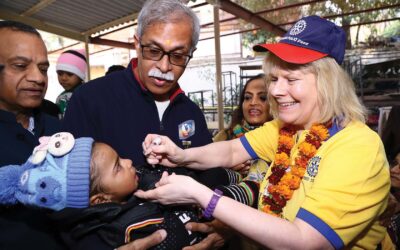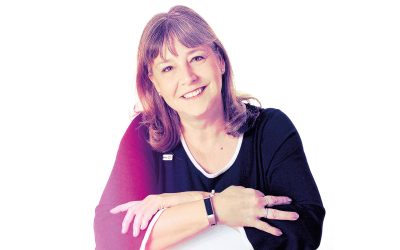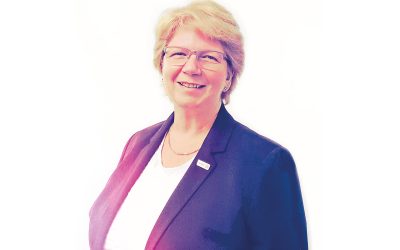It was meant to be just a week’s holiday in the sun.
Phil and Sue Taylor had chosen The Gambia in Western Africa as a spot away from the usual tourist destinations.
Listen to this article
But what started as week’s carefree getaway ended up being a 12 year-long environmentally-friendly recycling project which has helped thousands of Gambian children and dozens of schools and nurseries.
Sue, who with Phil is a member of Cleveland Rotary in North East England, said: “It all started with a chance meeting with a Gambian man at Manchester Airport on the way out to The Gambia.
“When we got there, he took us to his home and to places away from the tourist traps. It was very different to what we had imagined, very beautiful, and although it was very poor, the people were incredibly friendly and welcoming.”
One of the man’s circle of friends ran a nursery on the south coast and Phil and Sue were taken to see it.
Phil said: “I think it’s fair to say we were very shocked. It was very shambolic – there was no furniture, too many children, very little play equipment or toys, untrained staff.”
It started a train of thought.
It gives us a great deal of satisfaction knowing that perfectly usable school furniture, which would have ended up on the scrap heap here, has a second life helping young people in a country three thousand miles away.”
They knew they wanted to do something to help, and so Phil and Sue set about obtaining discarded play equipment from schools and nurseries in Cleveland, which volunteers – including their son and three grandchildren – filled what was the first of 12 containers shipped out to The Gambia in 2010.
They continue to go out there twice a year for up to a month at a time.
Sue, who was a primary school specialist consultant, said: “It wasn’t just about supplying the equipment. I also started training staff. And the children, who actually didn’t really know how to play.”
Phil described a time when the children were given items such as toy cars, skipping ropes, hoops and building blocks. “The children were amazed. We also introduced them to a giant parachute, widely used in UK schools, which they thought was magic.”
Word got out about what the Taylors were doing, and Phil and Sue visited more villages.
Sue said: “We went to a village called Gunjur where there was a large primary school. We asked the head teacher what he wanted and he said a computer. But when we asked the deputy head he said tables and chairs – just the basic needs of a school.”
That meeting sent the Taylors in a different direction. Sue knew that when schools in the UK were re-equipping with new furniture, the old desks and chairs, despite being perfectly serviceable, often ended up in landfill.
“So we first asked local authorities about obtaining some, but got no response. So we went knocking on the doors of schools throughout the area and all of them were happy to help.”
The Taylors recently sent their 12th container full of desks and chairs.
The furniture is stored free in a barn belonging to friends, Ian and Mandy Sullivan, and volunteers from Acklam Rugby Club and Wilton Golf Club – and their grandsons – help load and collect.
Furniture collections are done free by QA Weld Tech, a company in Middlesbrough.
Phil totted up the figures: “I reckon we have sent 10,000 chairs and 5,000 tables, plus boxes of books, and about 20,000 children in The Gambia use them, as they have two school sessions a day.
“It gives us a great deal of satisfaction knowing that perfectly usable school furniture, which would have ended up on the scrap heap here, has a second life helping young people in a country three thousand miles away.”
It wasn’t just about supplying the equipment. I also started training staff. And the children, who actually didn’t really know how to play.”
As well as the furniture project, a school in Madiana has been structurally improved, extended and equipped to be a centre for teacher training.
Other good news is that the project has become more sustainable.
Sue said: “We have changed the model, so we are now sending the containers through The Gambian Ministry for Education, with whom we have built a rapport, and are confident that the equipment will go to the right places.”
That’s not to say that the Taylors are backing away.
Phil said: “We love it there and will continue to go, and our three grandsons went with us in 2020. It’s very much part of the family tradition.”
Funding for each container – which costs about £5,000 to ship – is provided by Rotary North East District grants and money raised by an annual golf day, which this year raised £5,400.
It’s a model which could be used elsewhere, and the Taylors have a template which they are happy to share with other clubs.
Sue said: ‘It is a project which has given us great joy. There are thousands of young people whose educational and learning experience has been improved, and we hope there will be many more.’ l


























































